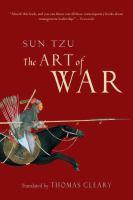
Often considered one of the best management strategy books of all time, The Art of War, by Tzu Sun, is as pertinent today as when it was compiled thousands of years ago. “Work smarter, not harder.” “The best battle is the one never fought.” “A boss says 'go.' A leader say’s 'let’s go.'” These sentiments are not new. The basis for each can be found in Tzu Sun’s writings. The Art of War applies to conflicts on all levels; from battlefields to board rooms. Sun stresses the virtues of patience, strategy and outthinking one’s opponents.
I picked The Art of War because it was short at 172 pages. I also remembered it being a classic. A short classic: win-win! A complete English translation can be downloaded from http://classics.mit.edu/Tzu/artwar.html (and other sites) and printed on only 26 pages. But as the translator, Thomas Clearing states in his introduction, “classics seem to grow wiser as we grow wiser, the more useful the more we use them.” (p. 38)
It is the translator, Thomas Clearing, and his treatment of the text that makes this version a great read. This volume offers commentaries on each of Sun’s verses with explanations and examples taken from a set of 11 different translators spanning a thousand years. In crisp, straightforward wording, Clearing emphasizes the Taoist leanings of Sun’s strategies as evident in the classic statement, “To win without fighting is best.” The passages are easy to read and express the meanings behind traditional phrases in a way that resonates with the 21st century reader.
